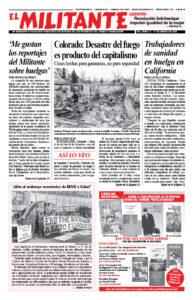January 20, 1997
WASHINGTON, D.C. — Fifty Black farmers and supporters from the National Black Farmers Association — coming from Virginia, North Carolina, South Carolina, Georgia, Louisiana and Texas — demonstrated in front of the White House December 12 to protest racist discrimination by the U.S. Department of Agriculture.
U.S. Secretary of Agriculture Daniel Glickman met with the farmers and announced December 18 a temporary halt to foreclosure sales on delinquent loans.
National Black Farmers Association president John Boyd said that the halt doesn’t go far enough. “We want to go back to 1968. Everyone with complaints filed with the USDA since then should be compensated, not just those facing foreclosure right now. This moratorium is temporary and leaves out most farmers. If these cases are not settled in 90 days we’ll be back to protest.”
January 21, 1972
The revolutionary offensive on major fronts throughout Indochina once again testifies to the strength of the liberation struggle in Southeast Asia despite eight years of Washington’s murderous counterrevolutionary warfare. There is no piece of land on the war-ravaged subcontinent that the imperialist-backed forces hold with certainty.
On Jan. 11, the Saigon regime reported the withdrawal of more than 10,000 troops from eastern Cambodia in order to bolster the defenses of Saigon. A dispatch to the New York Times from Saigon stated: “It is widely believed that the redeployment of South Vietnamese forces is a sign of fears the Saigon government has often expressed that the Communists may try to launch a major offensive next month before President Nixon visits Peking, to embarrass him there and in the United States in an election year.”
January 18, 1947
Jan. 14 — The British government’s use of troops yesterday to break the week-old strike of London truck drivers was condemned by workers throughout England. The first protest took the form of an immediate walkout by several thousand porters and food handlers employed in London’s major food markets. Sympathy strikes were later reported in Manchester, Bristol, Birmingham, Ipswich and Southampton.
The strike had begun a week ago with a few hundred drivers. By yesterday it had spread to 21,000 drivers and helpers handling meat and other foodstuffs in London. Among their demands were reduction of the work week from 48 to 44 hours, and overtime pay after eight hours.
The last time the Labor Party government used the armed forces against strikers was during the dock-workers’ struggle in the autumn of 1945.

